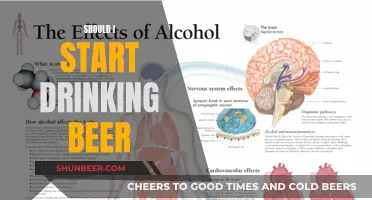
Drinking alcohol is a common activity at social events and celebrations, but it is important to be aware of the health risks associated with it. Excessive alcohol consumption is linked to an increased risk of stroke, and it can also hinder your recovery if you've previously had one. While moderate drinking is generally considered safe for healthy individuals, those who have experienced a stroke need to be cautious as alcohol can elevate their risk of another stroke and interfere with their medication.
| Characteristics | Values |
|---|---|
| Alcohol consumption after a stroke | It's important to seek individual advice from a doctor. |
| Alcohol's impact on stroke recovery | Alcohol can worsen symptoms like poor balance, speech problems, and mood swings. It can also affect memory and thinking. |
| Alcohol's impact on stroke risk | Drinking above the recommended limit increases the risk of stroke. |
| Recommended limit | The UK government advises drinking no more than 14 units per week. |
| Alcohol's effect on blood pressure | Excessive alcohol consumption can lead to high blood pressure, which is a major risk factor for strokes. |
| Alcohol's effect on weight | Alcoholic drinks are high in calories, making it challenging to maintain a healthy weight. |
| Alcohol's effect on diabetes | Alcohol consumption can make it difficult to control blood sugar levels, contributing to uncontrolled diabetes, a risk factor for strokes. |
| Alcohol's effect on atrial fibrillation | Alcohol can trigger atrial fibrillation, a type of irregular heartbeat linked to an increased risk of stroke. |
| Alcohol's effect on medication | Alcohol can interfere with certain medications, including blood thinners, potentially increasing the risk of bleeding. |
What You'll Learn
- Drinking alcohol after a stroke can increase the risk of having another stroke
- Alcohol can negatively impact speech, thinking, vision, and balance
- Alcohol can interfere with medication, especially blood thinners
- Excess alcohol consumption can lead to hypertension, which is a major risk factor for strokes
- Drinking alcohol can make it harder to maintain a healthy weight

Drinking alcohol after a stroke can increase the risk of having another stroke
Drinking alcohol after a stroke is not recommended. Alcohol consumption can increase the risk of having another stroke and can also negatively impact your recovery and wellbeing.
Alcohol can increase your risk of having another stroke by contributing to several conditions that are risk factors for strokes. These include:
- High blood pressure: Drinking alcohol raises your blood pressure, which is the most important risk factor for strokes, contributing to around half of all strokes in the UK.
- Type 2 diabetes: Drinking more than the recommended limit can increase your risk of developing type 2 diabetes, which is linked to an increased risk of stroke.
- Weight gain: Alcoholic drinks are often high in calories, and regular consumption can lead to weight gain, making it challenging to maintain a healthy weight. Being overweight is a risk factor for strokes.
- Atrial fibrillation: Drinking large amounts of alcohol can trigger atrial fibrillation, a type of irregular heartbeat linked to a higher risk of stroke.
In addition to increasing the risk of another stroke, drinking alcohol after experiencing one can also have other adverse effects. These include:
- Interference with medications: Alcohol can interfere with medications taken to reduce the risk of another stroke, such as blood thinners like warfarin and nimodipine.
- Increased vulnerability to alcohol's negative effects: After a stroke, individuals may find that alcohol worsens symptoms such as poor balance, speech problems, mood swings, and depression. It can also affect memory and thinking and make headaches worse by causing dehydration.
- Weight gain: As mentioned earlier, alcohol can contribute to weight gain, which is a risk factor for strokes.
If you have had a stroke, it is essential to seek individual advice about alcohol consumption from your doctor or healthcare provider. They can advise you on whether it is safe for you to drink, how much you can drink, and provide guidance on maintaining a healthy lifestyle to reduce the risk of another stroke.
Beer and Rapaflo: Safe Mix or Health Risk?
You may want to see also

Alcohol can negatively impact speech, thinking, vision, and balance
Alcohol negatively impacts speech, thinking, vision, and balance. Even a single drink can have an impact on cognitive function, leading to slurred speech, blurred vision, impaired memory, and poor hand-eye coordination. As the amount of alcohol consumed increases, so do these negative effects.
Excessive alcohol consumption can cause hypertension, which is a direct contributor to strokes. It can also lead to certain heart problems, such as atrial fibrillation and cardiomyopathy, which are also stroke risk factors. Additionally, alcohol inhibits coagulation, which is linked to hemorrhagic strokes.
The effects of alcohol on the brain are significant. It interferes with the brain's communication pathways and can affect how the brain processes information. This interference can lead to confusion, memory problems, and impaired judgment. Alcohol also increases the effects of gamma-aminobutyric acid (GABA), causing sluggish movement, slurred speech, and slow reaction times.
For individuals who have experienced a stroke, alcohol can exacerbate existing issues with speech, thinking, vision, and balance. It can also worsen fatigue and interfere with medications, such as blood-thinning medicines like warfarin. Therefore, it is crucial to seek advice from a doctor about alcohol consumption after a stroke.
Coffee and Beer: Mixing Drinks, Safe or Not?
You may want to see also

Alcohol can interfere with medication, especially blood thinners
Alcohol can have harmful interactions with prescription medications, over-the-counter drugs, and even some herbal remedies. It can alter the metabolism and pharmacological effects of many common medications, and certain drugs can change how you feel the effects of alcohol. Alcohol can make some medications less effective by interfering with how they are absorbed in the digestive tract. In some cases, alcohol increases the bioavailability of a drug, which can raise the concentration of the medication in your blood to toxic levels.
Drinking alcohol can also make the side effects of a medication worse or even cause new symptoms. This is especially true if you are taking a medication that makes you sleepy or causes sedation. More intense side effects mean you might be more impaired after having one drink than you would typically be. For example, the mixture of opiates and alcohol can cause your breathing to stop and is a common cause of death.
If you are taking a blood thinner, even an occasional drink can increase your risk of internal bleeding. Drinking often or heavily increases this risk and can also counteract the medication's blood-thinning effects. If your body is forming blood clots, it increases your risk of having a stroke or a heart attack.
The American Heart Association (AHA) recommends limiting your intake to no more than one or two occasional drinks if you are on anticoagulant therapy. However, it is important to talk to your doctor before having a drink if you are taking anticoagulant medication.
Drinking Beer on a Boat: Ontario's Laws
You may want to see also

Excess alcohol consumption can lead to hypertension, which is a major risk factor for strokes
Excessive alcohol consumption is a major risk factor for strokes. Alcohol abuse is a significant public health problem worldwide, with over 20 million people affected in the United States alone. Chronic high-dose ethanol consumption leads to physiological dysfunctions, including hepatic, gastrointestinal, nervous, and cardiovascular injuries.
Alcohol consumption can contribute to hypertension, which is a critical factor leading to strokes. Excessive alcohol intake can cause an increase in blood pressure, with systolic pressure increases being more prominent than diastolic increases. This rise in blood pressure is influenced by several factors, including:
- An imbalance in the central nervous system
- Impairment of baroreceptors
- Enhanced sympathetic activity
- Stimulation of the renin-angiotensin-aldosterone system
- Increased cortisol levels
- Increased vascular reactivity due to elevated intracellular calcium levels
- Stimulation of the endothelium to release vasoconstrictors
- Loss of relaxation due to inflammation and oxidative injury of the endothelium, inhibiting the production of nitric oxide
The link between alcohol consumption and stroke risk is evident. Drinking above the recommended limits increases the chances of having a stroke and can negatively impact recovery and well-being. Therefore, it is essential to stick within the guidelines on drinking to manage stroke risk effectively.
Beer and Surgery: Daily Drinking Habits and Health
You may want to see also

Drinking alcohol can make it harder to maintain a healthy weight
Drinking alcohol after a stroke can increase your risk of having another stroke and affect your recovery. Doctors can advise on whether and when it is safe to drink alcohol after a stroke, and how much alcohol is safe to consume.
Alcohol can also cause weight gain by providing the body with empty calories. Alcoholic drinks are often high in calories due to their sugar content, and regular consumption can contribute to weight gain. Additionally, alcohol can increase the risk of developing health conditions that affect weight, such as high blood pressure, diabetes, and heart disease.
Alcohol can also negatively impact the pancreas, causing it to produce toxic substances that can lead to pancreatitis. Pancreatitis is a dangerous inflammation of the pancreas that impairs its ability to produce enzymes and hormones necessary for proper digestion. This can further contribute to weight gain or make it harder to maintain a healthy weight.
Furthermore, alcohol can disrupt sleep patterns, making it difficult to fall asleep, stay asleep, or achieve quality sleep. Lack of quality sleep can impact weight maintenance by affecting hormones that regulate hunger and fullness, increasing the risk of weight gain.
To maintain a healthy weight, it is important to limit alcohol consumption and practice moderation. Reducing alcohol intake can help improve overall health and lower the risk of weight-related health issues.
Managing High Blood Sugar: Beer's Impact and Your Health
You may want to see also
Frequently asked questions
It is not recommended that someone who has had a stroke drinks beer or any other form of alcohol as it can increase their risk of having another stroke. It is best to consult a doctor about alcohol consumption post-stroke.
Alcohol can increase the impact of changes to speech, thinking, vision, and balance caused by a stroke. It can also interfere with medication and cause dehydration, making headaches worse.
According to the UK government guidelines, drinking more than 14 units of alcohol per week increases the risk of a stroke. This equates to about six pints of average-strength beer.







